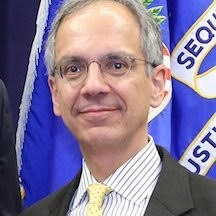Just to start at the beginning: I always knew I’d be a lawyer.
I can’t wait for our 45th law school reunion this June! As soon as I was asked, I gladly volunteered to serve as class reunion chair because, frankly, I can’t believe it’s been 45 years and I look forward to reconnecting after all these years. I really appreciate the GW Alumni Office’s efforts to bring us all back together on June 2-3.
Why did you want to pursue a law degree?
It all started with watching Perry Mason in the ‘60s and then things really took off in college. At Syracuse, I followed a pre-law track and, thanks to two great mentors in the Maxwell School of Citizenship & Public Affairs – Donald Meiklejohn & Ralph Ketcham – I wrote my senior thesis in 1975 on the Constitution and its evolution from the Articles of Confederation.
Why DC?
I selected GW Law because it was in the heart of the city where I wanted to spend the rest of my life – and, so far, I have. DC was everything I expected and more. GW Law gave me opportunities I never imagined, like helping folks through GW’s Community Legal Clinic (then run by Professor Eric Sirulnik) and participating in the Van Vleck Moot Court competition.
In my 3L year in 1978, I clerked at the Interstate Commerce Commission (ICC), the nation’s first transportation regulatory agency – where I ran into a classmate, Wayne Michel, who quickly became a good friend and the best man at my wedding ten years later.
What was your first job following law school?
After graduation, my clerkship led to a full-time position as an ICC attorney, where my tenure’s highlight was coordinating a “directed service” case with the Commission’s Chairman as the Carter Administration was dealing with a crippling Rock Island Railroad strike. I couldn’t believe that, at such a young age, I was helping to forestall severe grain losses throughout the Midwest.
Tell us about your mid-career?
After a few years at the ICC, I joined a private transportation law firm, but the firm folded as the industry deregulated. As it turned out, that was a blessing in disguise, because it got me back into federal service as a full-fledged trial attorney with the Office of Litigation at the Department of Housing & Urban Development, where I worked hand in hand with the Justice Department in both district court and appellate litigation.
Not satisfied with being the “second chair” in cases, I applied to DOJ and landed a job as a trial attorney in the Civil Division – even though the job came with a huge caseload of around 40 cases at any given time. In fact, one week I had not one, but three, appellate arguments scheduled before the Federal Circuit, which required a bit of effort to keep each case’s facts and law straight. Yet, it was exhilarating.
After seven years of working 10-12 hour days and most weekends in the Civil Division – and following the birth of our daughter – I decided to move from front-line litigating to more executive duties. Fortunately, I was able to transfer to the Department’s Executive Office for U.S. Trustees, which gave me experience in developing policies and procedures in a new field – bankruptcy law. It was quite a “sea change” from my time litigating government contracts disputes and other cases “in the trenches.”
Any career surprises?
And then something even more unexpected happened, which altered my entire career path; the bankruptcy courts started going electronic with “e-filing” in the late ’90s. Having a bit of a reputation as a “techy lawyer,” I quickly became a key point person for coordinating with the courts as the federal judiciary rolled out its new Electronic Case Filing (ECF) system. After a few years navigating the nuances of ECF in the bankruptcy courts, I transitioned to a similar role in the Department’s Executive Office for U.S. Attorneys in 2004 where I helped coordinate e-filing issues with all 94 federal district courts and 13 appellate circuits, ultimately serving as senior counsel to the U.S. Attorneys’ Chief Information Officer.
What Advice would you share with future lawyers?
Follow your heart. If the law is for you, you’ll “know” it in your gut and nothing else will suffice. And, if you really want to make an impact, consider government service, where responsibility comes early and rewards are not measured in dollars.


